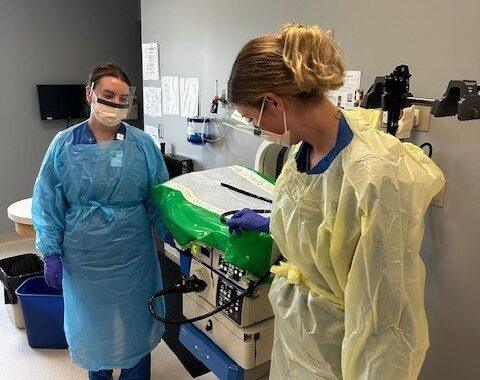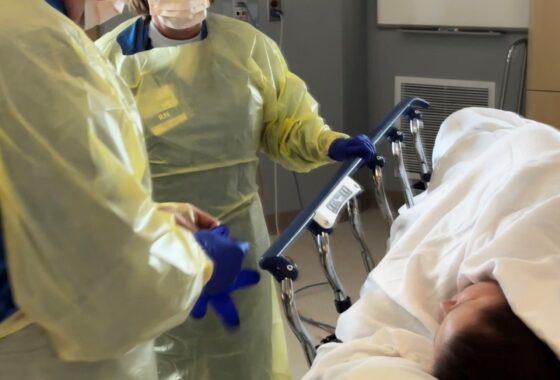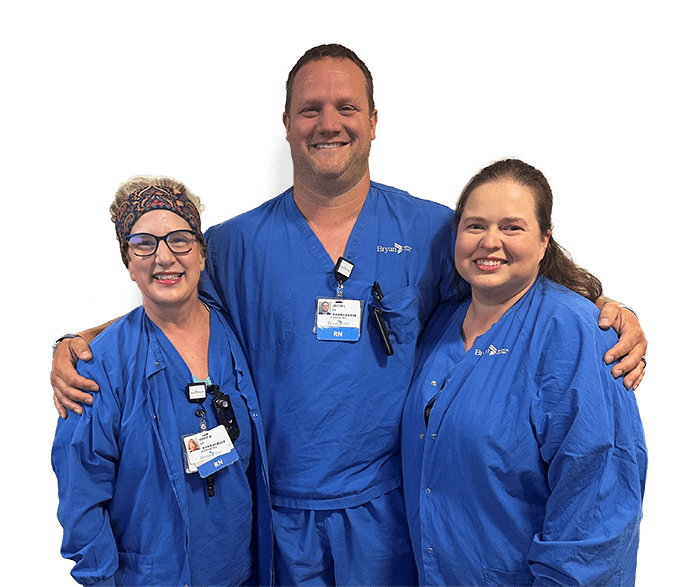

Procedure Prep Instructions
Diet medications such as phentermine need to be held
Ask your doctor about your medications if you’re unsure.
Stop taking these meds:
- Byetta
- Dulaglutide
- Liraglutide
- Monjaro
- Ozempic
- Saxenda
- Semaglutide
- Tirzepatide
- Trulicity
- Victoza
- Wegovy
- Zepbound
Blood-thinning medications may need to be held.
You will receive specific instructions.
Anti-inflammatory meds need to be held. (Celebrex, ibuprofen, naproxen)
Over-the-counter vitamins and supplements need to be held, including fish oil and iron.
No flax seeds, chia seeds, or foods with small seeds
Ask your doctor about your medications if you’re unsure.
Stop taking these meds:
- Adipex
- Aggrenox
- Atti-Plex
- Brilinta
- Cilostazol
- Coumadin
- Clopidogrel
- Effient
- Fastin
- Lomaira
- OraVerse
- Osymia
- Phentermine
- Plavix
- Pletal
- And More.
Blood-thinning medications may need to be held.
You will receive specific instructions.
Anti-inflammatory meds need to be held. (Celebrex, ibuprofen, naproxen)
Over-the-counter vitamins and supplements need to be held, including fish oil and iron.
No flax seeds, chia seeds, or foods with small seeds
Ask your doctor about your medications if you’re unsure.
Stop taking these meds:
- Ertugliflozin
- Segluromet
- Steglujan
- Steglatro
- Bexagliflozin
- Brenzavvy
- Canagliflozin
- Invokana
- Dapagliflozin
- Edistride
- Ebymect
- Empagliflozin
- Forxiga
- Flyxambi
- Glyxambi
- And More.
Blood-thinning medications may need to be held.
You will receive specific instructions.
Anti-inflammatory meds need to be held. (Celebrex, ibuprofen, naproxen)
Over-the-counter vitamins and supplements need to be held, including fish oil and iron.
No flax seeds, chia seeds, or foods with small seeds
Ask your doctor about your medications if you’re unsure.
Stop taking these meds:
- Contrave
- Naltrexone
- Anti-diarrhea meds
Blood-thinning medications may need to be held.
You will receive specific instructions.
Anti-inflammatory meds need to be held. (Celebrex, ibuprofen, naproxen)
Over-the-counter vitamins and supplements need to be held, including fish oil and iron.
No flax seeds, chia seeds, or foods with small seeds
Ask your doctor about your medications if you’re unsure.
Stop taking these meds:
- Apixaban
- Eliquis
- Pradaxa
- Xarelto
CLEAR LIQUIDS ONLY FOR THE ENTIRE DAY! DO NOT EAT TODAY!
Do not take diuretics/water pills.
Do not take Rybelsus.
1st dose of prep at 5PM.
CONTINUE CLEAR LIQUIDS.
2ND dose of prep 4hrs before leaving your house.
Do NOT drink anything after completing your prep.
NO oral diabetic meds. Ok for 1/2 dose of insulin, hold all other injectable diabetic medications
OK to take BP meds, asthma/respiratory meds, seizure meds, Parkinson’s meds, and steroids with sips of water at least 2 HOURS before you check in.
Clear liquids = water, juice without pulp, sports drinks, Jello, popsicles, sodas, soup broth, tea, black coffee (sugar ok, NO creamer).
- NO red dyes (red, dark blue, or dark purple colors)
- NO milk or dairy products
- NO alcohol
Bring a driver with you. NO public transportation, Lyft, or Uber.
FOR YOUR SAFETY, FAILURE TO FOLLOW THESE INSTRUCTIONS MAY RESULT IN YOUR PROCEDURE BEING CANCELLED.
Flexible Sigmoidoscopy FAQ
What Preparation is Required?
Your doctor will tell you what cleansing routine to use. In general, preparation consists of one or two enemas prior to the procedure, but could include laxatives or dietary modifications as well. However, in some circumstances, your doctor might advise you that special preparation is not necessary. Because the rectum and lower colon must be completely empty for the procedure to be accurate, it’s important to follow your doctor’s instructions carefully.
Should I Continue My Current Medications?
Most medications can be continued as usual. Inform your doctor about medications that you’re taking – particularly aspirin products or anticoagulants (blood thinners) — as well as any allergies you have to medications. Also, tell your doctor if you require antibiotics before dental procedures, because you might need antibiotics prior to sigmoidoscopy as well.
What Are The Possible Complications of Flexible Sigmoidoscopy?
Flexible sigmoidoscopy is a safe and routine procedure with a low risk of complications. However, as with any medical procedure, there are some potential risks including bleeding, perforation, abdominal discomfort or cramping, infection, or reaction to sedation if used.
Your care team takes every precaution to minimize these risks and ensure your safety. Your doctor will discuss any concerns with you before the procedure.
What if The Flexible Sigmoidoscopy Finds Something Abnormal?
If your doctor sees an area that needs further evaluation, your doctor might take a biopsy (sample of the colon lining) to be analyzed. Biopsies are used to identify many conditions, and your doctor might order one even if he or she doesn’t suspect cancer.
If your doctor finds polyps, he or she might take a biopsy of them as well. Polyps, which are growths from the lining of the colon, vary in size and type. Polyps known as “hyperplastic” might not require removal, but benign polyps known as “adenomas” are potentially precancerous. Your doctor might ask you to have a colonoscopy (a complete examination of the colon) to remove any large polyps or any small adenomas.
What Happens After a Flexible Sigmoidoscopy?
Your doctor will explain the results to you when the procedure is done. You might feel bloating or some mild cramping because of the air that was passed into the colon during the examination. This will disappear quickly when you pass gas. You should be able to eat and resume your normal activities after leaving your doctor’s office or the hospital, assuming you did not receive any sedative medication.
If you have been given sedatives during the procedure, someone must drive you home and stay with you. No public transportation. Even if you feel alert after the procedure, your judgment and reflexes could be impaired for the rest of the day. No driving or alcohol for the remainder of the day.
